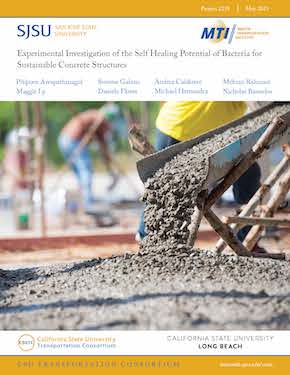- 408-924-7560
- mineta-institute@sjsu.edu
- Donate
Experimental Investigation of the Self-Healing Potential of Bacteria for Sustainable Concrete Structures
Although concrete is the most widely used building material in the world, its limited tensile strength makes cracking a common phenomenon in concrete elements. This study investigates the potential of autonomous self-healing as an eco-friendly and low-cost method to increase the durability of concrete. The crack-healing potential of different types of high-alkaline-tolerant bacteria or calcite-precipitation microorganisms is investigated. High-alkaline-tolerant bacteria and calcite-precipitation microorganisms were used to retrofit lab-fractured concrete samples. The samples healed with each of these bacteria groups were cast and tested under compressive load up to failure to measure the compressive strength of the concrete samples. The outcomes of experimental tests on concrete samples healed with biological processes demonstrate how this technique can be implemented when retrofitting durability-enhanced, eco-friendly concrete structures to improve the strength of durability of the material and ultimately improve the durability of many forms of concrete infrastructure.
PITIPORN ASVAPATHANAGUL, PHD, PE
Dr. Pitiporn Asvapathanagul is a faculty member in Civil Engineering and Construction Engineering Management (CECEM) Department at California State University, Long Beach (CSULB). Her area of competence is Environmental Engineering, primarily bioremediation, biology wastewater treatment, and molecular biology. Examples of her research are bacterial community dynamics in activated sludge, nutrient removal of biological water reclamation processes, biofilms on aeration diffuser membranes, microplastic removal technologies, etc. Dr. Asvapathanagul is also a registered Professional Engineer (PE) in the state of California. Dr. Asvapathanagul employed her expertise in microbiology to advance the accomplishments of the self-healing concrete project.
SIMONE GALANO, PHD, VISITING SCHOLAR
Dr. Simone Galano is a postdoctoral researcher at the University of Naples Federico II. He gained his PhD in Structural, Geotechnical, and Seismic Risk Engineering at the University of Naples Federico II in 2022. Since 2019, he has worked with the CSULB’s CECEM Department as a visiting researcher. Dr. Galano’s research activities are in the fields of seismic isolation with elastomeric devices, prestressed concrete structures, and the durability of existing prestressed concrete bridges. He authored many research studies including experimental tests and numerical analyses of fiber reinforced elastomeric isolators with natural, recycled, and reclaimed rubber, and reduced-scale post-tensioned concrete bridge girders. For this project, Dr. Galano elaborated on the experimental data, wrote the draft, and reviewed the final version of this report.
ANDREA CALABRESE, PHD, ING, CENG, MICE
Dr. Calabrese joined the CSULB’s CECEM Department as an Assistant Professor in Fall 2017. He gained a PhD in Construction Engineering with an emphasis in Structural Engineering in 2013. He was a visiting research fellow at the Pacific Earthquake Engineering Research Center (PEER) from 2010–2012 along with having been a postdoctoral researcher of the ReLUIS Consortium at the Italian Network of University Laboratories in Earthquake Engineering from 2013–2014. Dr. Calabrese has worked as a Structural Engineer at Foster & Partners (London) and for other firms in Italy for seven years. He has been a registered engineer in Italy since 2009 and a Chartered Engineer (CEng) and Full Member of the Institution of Civil Engineers (MICE) in the UK since 2017. Dr. Calabrese’s current research interests are in the fields of experimental testing, structural dynamics, base isolation, vibration engineering, and the development of novel low-cost devices for the seismic protection of buildings. He has carried out numerous large-scale experimental studies of base isolation systems and energy-absorbing devices on the shaking table at the Department of Structural Engineering at the University of Naples in Italy. This work has been instrumental in developing low-cost seismic isolation systems using recycled rubber and flexible reinforcements for the seismic protection of buildings in developing regions. His responsibilities for this research included conceptualization of the work, data analysis, and final editing of the report.
MEHRAN RAHMANI, PHD, PE
Dr. Mehran Rahmani is an Assistant Professor in the CECEM Department at CSULB. He earned his PhD in Structural and Earthquake Engineering from the University of Southern California (USC) in 2014. His research focuses on structural system identification, structural health monitoring, and earthquake damage detection of buildings and bridges using sensory data. Dr. Rahmani is a registered Professional Engineer (PE) in the state of California. In this project, Dr. Rahmani was responsible for training the research team for using the testing equipment, helping to design the concrete testing protocol, troubleshooting testing equipment hardware and software issues, and overseeing the concrete cylinder testing process.
MAGGIE LY, RESEARCH ASSISTANT
Maggie Ly is a post-graduate student in the CECEM Department at CSULB. She graduated with a BS in Civil Engineering in Fall 2019 at the same university and began pursuing her MA in Fall 2020. During her time as an undergraduate student, she assisted Dr. Pitiporn Asvapathanagul in performing research tasks relating to identifying bacteria in wastewater in the Environmental Engineering Laboratory. Subsequently, Maggie decided to work on her thesis “Applying...” under Dr. Asvapathanagul’s supervision. Maggie was responsible for culturing bacteria, forming biochar using food wastes, manufacturing concrete test samples, landing bacteria in the concrete, and running tests on the concrete samples.
DANIELA FLORES, RESEARCH ASSISTANT
Daniela Flores is an undergraduate research student in the Mathematics and Statistics Department at CSULB. She is pursuing a degree in Applied Mathematics with a focus in science and engineering. Her responsibilities in this study consisted of the manufacturing and testing of the samples and contributing to writing the report.
-
Contact Us
San José State University One Washington Square, San Jose, CA 95192 Phone: 408-924-7560 Email: mineta-institute@sjsu.edu






